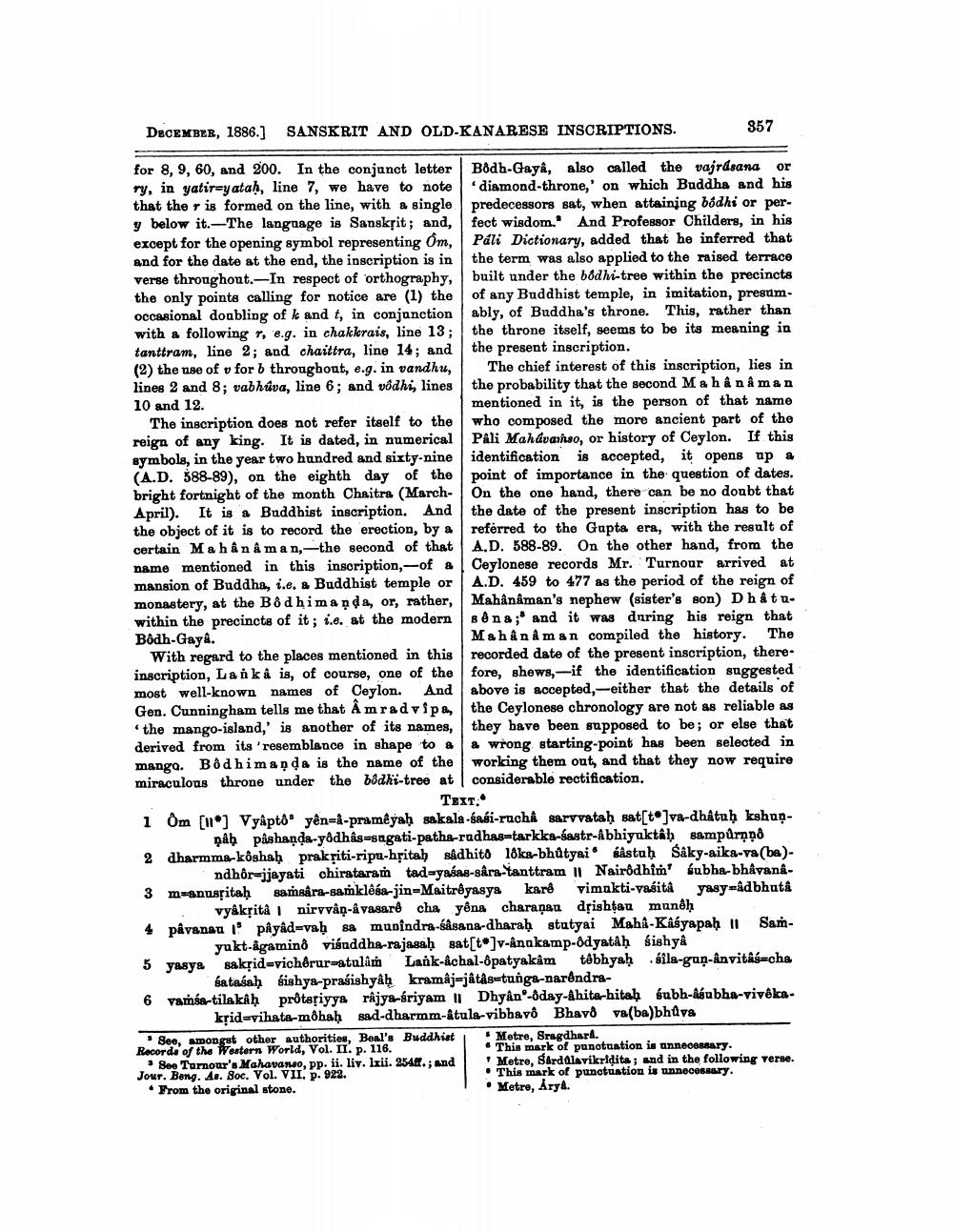________________
DECEMBER, 1886.] SANSKRIT AND OLD-KANARESE INSCRIPTIONS.
857
for 8, 9, 60, and 200. In the conjunct letter Bodh-Gaya, also called the vajrasana or ry, in yatirey atah, line 7, we have to note diamond-throne,' on which Buddha and his that the r is formed on the line, with a single predecessors sat, when attaining bodhi or per y below it. -The language is Sansksit; and, fect wisdom.' And Professor Childers, in his except for the opening symbol representing Om, Pali Dictionary, added that he inferred that and for the date at the end, the inscription is in the term was also applied to the raised terrace verse throughout.-In respect of orthography, built under the bodhi-tree within the precincts the only points calling for notice are (1) the of any Buddhist temple, in imitation, presumoccasional doubling of k and t, in conjunctionably, of Buddha's throne. This, rather than with a following r, e.g. in chakkrais, line 13; the throne itself, seems to be its meaning in tanttram, line 2; and chaittra, line 14; and the present inscription. (2) the nse of v for b throughout, e.g. in vandhu, The chief interest of this inscription, lies in lines 2 and 8; vabhuva, line 6; and vôdhi, lines the probability that the second Mahânâ man 10 and 12.
mentioned in it, is the person of that name The inscription does not refer itself to the who composed the more ancient part of the reign of any king. It is dated, in numerical PAli Mahdvanso, or history of Ceylon. If this symbols, in the year two hundred and sixty-nine | identification is accepted, it opens apa (A.D. 588-89), on the eighth day of the point of importance in the question of dates. bright fortnight of the month Chaitra (March- On the one hand, there can be no doubt that April). It is a Buddhist inscription. And the date of the present inscription has to be the object of it is to record the erection, by a referred to the Gupta era, with the result of certain Ma hân & man,--the second of that A.D. 588-89. On the other hand, from the name mentioned in this inscription, -of a Ceylonese records Mr. Turnour arrived at mansion of Buddha, i.e. & Buddhist temple or A.D. 459 to 477 as the period of the reign of monastery, at the B8 dhimaņda, or, rather, Mahânâman's nephew (sister's son) Dhåtuwithin the precincts of it; i.e. at the modern sena;' and it was during his reign that Bôdh-Gaya.
Mahanaman compiled the history. The With regard to the places mentioned in this recorded date of the present inscription, there. inscription, Lanka is, of course, one of the fore, shews,-if the identification suggested most well-known names of Ceylon. And above is accepted, -either that the details of Gen. Cunningham tells me that Amrad vip, the Ceylonese chronology are not as reliable as
the mango-island,' is another of its names, they have been supposed to be; or else that derived from its 'resemblance in shape to a wrong starting-point has been selected in mango. Bôdhimada is the name of the working them out, and that they now require miraculous throne under the bodki-tree at considerable rectification.
Text: 1 Ôm [11] Vyaptô yên=&-pramêyah sakala-sabi-ruch sarvvataḥ sat[t]va-dhâtuh kshun
påb påshanda-yodhas-sagati-paths-rudhas-tarkka-sastr-Abhiyuktah sampurnnd 2 dharmma-kôshaḥ praksiti-ripa-hřitah sâdhito 18ka-bhůtyai kâstaḥ Śâky-aika-va(ba)
ndhôrajjayati chirataram tad-yasas-sâra-tanttram | Nairðdhim' Subba-bhậvana3 m=anussitaḥ samsara-samklesa-jin-Maitreyasya karê vimakti-vasitâ yasy-adbhatâ
vyakritâ nirvvân-& vasarê cha yêna charaṇau dạishtau maneh 4 pávanau pâyâd-vah sa munîndra-sâsana-dharah stutyai Maha-Kaśyapah 1 Sam
yukt-agaminô viếuddha-rajasah sat[t]v-ånakamp-odyatAh sishya 5 yasya sakrid=vichêrur-atulam Lank-achal-patyakâm têbhyaḥ śila-guņânvitas-cha
satasah sishya-prasishyâh kramaj-ját&s=tunga-narándra6 vamsa-tilakah prôtariyya rajya-sriyam 11 Dhyân-day-Ahita-hitah subh-Asubha-vivêka
křidavihata-môhah sad-dharmm-atula-vibhavô Bhavð va(ba)bhůva Seo, amongst other authorities, Beal's Buddhist | Metre, Sragdhari. Records of the Western World, Vol. II. p. 116.
• This mark of punotuation is unnecessary. • See Tarnour's Mahavando, pp. ii. liv. lxii. 254ff.; and Metre, Sardalavikrl_ita; and in the following terse. Jour. Bong. As. Soc. Vol. VII. p. 922.
. This mark of punctuation is unnecessary. • From the original stone.
• Metro, Aryk.




